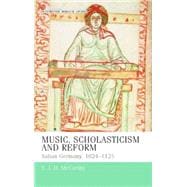
| List of maps and figures | p. xi |
| List of plates | p. xiii |
| Acknowledgements | p. xv |
| Abbreviations | p. xvii |
| The ancient Greek systema teleion and the south-German gamut | p. xix |
| Introduction | p. 1 |
| The South-German Circle: An Historical Introduction | p. 11 |
| Eleventh-century monastic reforms | p. 11 |
| Reform and friendship networks | p. 15 |
| Reichenau and the beginnings of the south-German circle | p. 18 |
| Bern of Reichenau | p. 18 |
| Herman of Reichenau | p. 23 |
| St Emmeram and the development of the south-German circle | p. 31 |
| William of Hirsau | p. 31 |
| Theoger of Metz | p. 34 |
| Aribo | p. 37 |
| Frutolf of Michelsberg | p. 40 |
| The wider south-German circle | p. 43 |
| The 'Wolf Anonymous' | p. 44 |
| Master Henry of Augsburg | p. 45 |
| John | p. 47 |
| Questiones in musica | p. 50 |
| Other theorists | p. 52 |
| Ancient Doctors and Modern Master: The South-German Circle at Work | p. 55 |
| Classical sources for music theory | p. 55 |
| Boethius | p. 56 |
| The influence of the Carolingian theorists | p. 60 |
| The influence of Bern of Reichenau upon the south-German circle | p. 62 |
| The impact of Herman of Reichenau upon the reception of Prologus in tonarium | p. 62 |
| The interpolated version of Prologus in tonarium | p. 72 |
| The influence of Guido of Arezzo | p. 80 |
| Guido and Herman of Reichenau | p. 82 |
| Guido and the wider south-German circle | p. 85 |
| The transmission of ideas within the south-German circle | p. 93 |
| Frutolf of Michelsberg | p. 94 |
| Dialectic and The Theory of Music | p. 109 |
| Dialectical texts in German libraries | p. 110 |
| Attitudes to dialectic in the eleventh century | p. 113 |
| The ars logica in eleventh-century literature | p. 116 |
| Dialectic in the south-German music treatises | p. 120 |
| The two sets of tetrachords | p. 122 |
| Tetrachords and the 'seats of die modes' | p. 125 |
| 'Species' theory | p. 126 |
| Taxonomy of modes | p. 130 |
| The division of music according to Henry of Augsburg | p. 132 |
| Anonymous I and the Wolf Anonymous on the species of consonance | p. 135 |
| Dialectic in Aribo's De musica | p. 138 |
| Conclusion | p. 145 |
| Plato, His Interpreters and The South-German Circle | p. 147 |
| Manuscript sources for Platonic texts in eleventh-century Germany | p. 148 |
| Timaeus in Calcidius' translation and commentary | p. 148 |
| Macrobius' Commmtarius in Somnium Scipionis | p. 150 |
| Martianus Capella's De nuptiis Philologiae et Mercurii | p. 151 |
| Platonic influence in the south-German music treatises | p. 152 |
| The significance of number | p. 152 |
| Platonic metaphor and vocabulary | p. 158 |
| Aribo and Platonic language | p. 162 |
| God and natura | p. 168 |
| Conclusion | p. 171 |
| 'Textbook Codices': Music Theory Manuscripts of The Eleventh and Twelfth Centuries | p. 175 |
| The textbook codex tradition | p. 175 |
| Bernold of St Blasien: a compiler and adapter of texts | p. 176 |
| Doctrinal handbooks | p. 178 |
| Hartwic of Stemmeram | p. 179 |
| Textbooks in die linguistic arts | p. 181 |
| Music theory compilations and textbooks | p. 182 |
| Kassel, Landesbibliothek und Murhardsche Bibliothek der Stadt Kassel, 4° Mss Math. I | p. 183 |
| Music theory textbooks | p. 196 |
| Guido of Arezzo | p. 200 |
| Pseudo-Odo of Cluny | p. 203 |
| Bern of Reichenau | p. 203 |
| Herman of Reichenau | p. 205 |
| William of Hirsau | p. 205 |
| Theoger of Metz | p. 206 |
| Aribo | p. 207 |
| Frutolf of Michelsberg | p. 208 |
| The Wolf Anonymous, Master Henry of Augsburg, John and Quaestiones in musica | p. 208 |
| Carolingian works | p. 208 |
| Classical authors | p. 210 |
| Tonaries | p. 210 |
| Notated didactic verses | p. 211 |
| Measurement texts | p. 211 |
| Other miscellaneous texts | p. 213 |
| Conclusions | p. 214 |
| Conclusion | p. 217 |
| Bibliography | p. 229 |
| Index | p. 255 |
| Table of Contents provided by Ingram. All Rights Reserved. |
The New copy of this book will include any supplemental materials advertised. Please check the title of the book to determine if it should include any access cards, study guides, lab manuals, CDs, etc.
The Used, Rental and eBook copies of this book are not guaranteed to include any supplemental materials. Typically, only the book itself is included. This is true even if the title states it includes any access cards, study guides, lab manuals, CDs, etc.